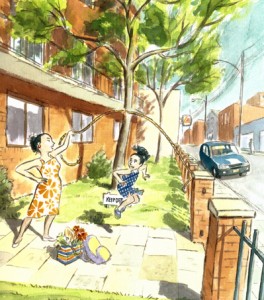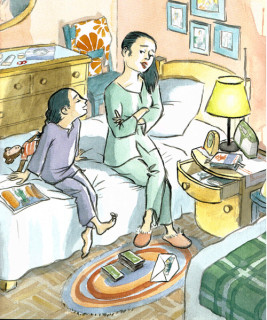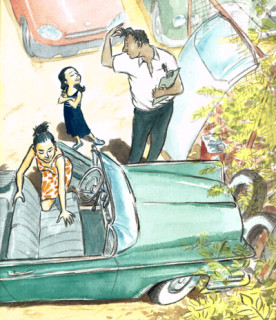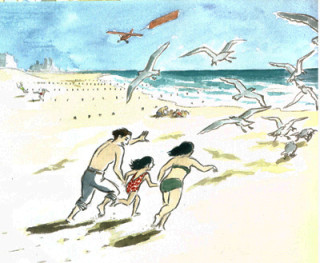New Writer Interview
Meg Medina: Tsa Isa
Interviewed by Margot Abel, Associate Director, Ezra Jack Keats Foundation

Were you a big reader as a girl?
Oh, yes. I loved reading—and writing, too, although I was also a child who had trouble sitting still, so I could be found playing tag or roller skating just as easily.
My favorite reading memory is when my uncle taught me to read in Spanish. He brought home a primer of some sort and went over the basic vowel sounds in Spanish, which are straightforward and unchanging, unlike English, which is topsy-turvy. I remember sitting next to him and feeling Spanish words unlock right before my eyes. And because I could already speak Spanish, I knew what I was reading. It was fantastic! I felt so proud.
You’ve written,“Families need their own tales to survive hard times, and those stories are a rope that can attach even the youngest children to their roots.” How do you feel a child’s awareness of her heritage helps her in forging her individual identity?
It’s key. I think a child’s sense of self has to include a sense of a context. At least it was that way for me. I was not only a child who grew up in Queens, New York. I was the daughter of a woman who worked in rural schools in Cuba. I was the granddaughter of a woman who rolled cigars and survived hurricanes. I was the niece of man who was jailed for trying to leave his country without permission. Those stories gave me a sense of place in history and in my family, a sense of what I came from, and a sense of my family’s strength. It was up to me to add my own lines to the family story…and my children will tell those one day.
Context is especially important for children whose background isn’t necessarily understood or properly valued. You’ll see any number of negative stories about Latinos, for example. These are usually debates about immigration that spill over into gross generalizations and stereotypes. The talk is toxic, and children are not deaf. A good understanding of your culture gives you a sense of pride, a set of protective tools against all of that.
When you were writing this book, how did you imagine the illustrations? Did you confer with the illustrator? Did he capture the moments you wanted? How does the writer of a storybook make room for the illustrator?
Typically, authors aren’t allowed to confer with their illustrator—which came as a huge surprise to me. What I most admire about Claudio [Muñoz] is that he captures subtle emotion so well on his character’s faces. I’m especially fond of the quiet panel, where they’re reading the letter together—not to mention the fabulous spread of the car as Isa is feeling the seats. As for leaving room for him—I wish I had left even more, if only to see where he would have taken it.
Generally, though, a writer leaves room for the illustrator by keeping description very sparse. I wrote the sensory details the way a child would experience them—the smell of lemon pies, clouds in a car’s hood, and so on. But my focus was mostly on getting across the idea of family as she was experiencing it, the sense of longing. It was up to Claudio to show us what they looked like, their mannerisms, the little moments between them that I hadn’t mentioned.
Has Ezra Jack Keats been an influence on your work? (There’s no right answer!)
The Snowy Day will always be one of my favorite books. Really, the benefit I reap from his work is true for all of us who represent a spectrum of cultures. He consistently used minority children as the main characters in his books. We take that for granted today, but it was groundbreaking then. When I write a book with Latinos as the main characters, I don’t assume that only Latino children will be drawn to it. I think of it as a story for everyone. Mr. Keats made that possible.
Which other writers have influenced you?
I love the blend of magic and the peculiar personalities that are captured and glorified in Latino literature…the drama. But in terms of literature for young people, I love the soulful and quiet authors, who create deep characters whether in picture books or novels. Kate DiCamillo. An Na. Jennifer Donnelly. Sonya Harnett. Kevin Henkes.
How do you think receiving the EJK Book Award will affect your career?
Well, I hope it introduces my work to new readers, of course. But on a personal level, I think it’s going to give me the courage to keep inventing. It’s easy to lose your nerve at the beginning of your career because publishing can be a hard business. To receive an acknowledgement like this is so affirming, and it’s a perfect complement to the relationship I have with my editor, Kate Fletcher. The EJK Book Award will remind me to trust my instincts as a writer and see what happens.
 What advice do you give hopeful young writers?
What advice do you give hopeful young writers?
Look to the small moments of your life that you haven’t forgotten. We remember those events because they matter deeply on some level. The question to ask is, Why do you remember it? Why did it matter to you as a child? Those answers can work as magic keys to let you back into the world of your childhood.
